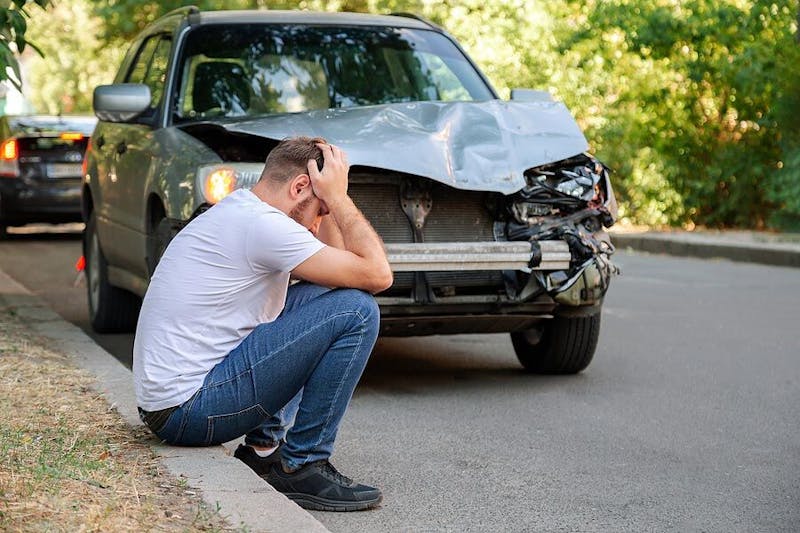Get a Free Consultation
2 minute response
24 hours a day, 7 Days a Week
Dedicated Trust Guss Intake Team

After a car accident, many find themselves experiencing anxiety or emotional distress unlike ever before. They might have a hard time getting behind the wheel again or even riding in a car driven by someone else.
Victims might even find themselves suffering PTSD-like flashbacks. Physical injuries from a car accident make it incredibly difficult for you to go about your normal life and activities, but so do emotional traumas.
Can you sue for anxiety, emotional distress, or other emotional challenges following a car accident? Short answer: Yes.
However, recovering the compensation you deserve may prove more complicated than you think. Having a car accident attorney on your side is critical to getting the compensation you need.

Yes you can sue for emotional distress after a car accident. As an injured accident victim, you can sue for all types of damages, including medical bills, lost wages, and pain and suffering. Emotional distress is a type of non-economic damage. Injured accident victims need a lawyer on their side who can fight for these types of damages and ensure maximum compensation after a car accident.
Emotional distress after a car accident can take many forms. To claim compensation for emotional distress from a car accident, you will need to start with identifying the specific emotional stress stemming from your car accident.
For example, if you were diagnosed with depression before the car accident, and it does not change after the car accident, it is unlikely you will be able to recover compensation for the costs of treating it.
On the other hand, if you have newly diagnosed depression after a car accident, you may have the right to be compensated for emotional or psychological distress.
Post-traumatic stress disorder, or PTSD, occurs following a traumatic event. The chaos of a car accident can easily feel traumatic for anyone.
The sudden collision of the vehicles, the crunch of metal, and the pain of the accident itself are all terrifying, mentally scarring events.
The mental and emotional suffering may only grow for people trapped in their vehicles, especially if the vehicle remains in the middle of traffic or the accident extends the victim’s exposure to other health and safety hazards.
PTSD can manifest as a variety of symptoms. Often, PTSD victims go to strenuous lengths to avoid being reminded of the car accident.
For some people, that means not going past the location where the accident took place, which might be on the most direct way to their work and other locations they frequent. For others, it may mean not being able to get in a car at all.
In its most extreme form, PTSD involves flashbacks about the accident, in which a trigger sends a victim back to that time and forces them to live through it all over again.
PTSD can make it difficult to do anything that involves getting behind the wheel of a car or even riding along in a vehicle as a passenger.
It can also interfere with daily life in other ways, such as causing painful or uncomfortable symptoms at even the sight of a car or the location where the accident took place.
People may have new or increased anxiety after a car accident, feeling unexpectedly tense, worried, or upset, often about relatively ordinary, everyday situations.
Anxiety can cause fear of getting into a car as you worry you might suffer serious injuries. You may do your best to avoid the places or situations that trigger those feelings, but still find them steadily increasing after your car accident, especially if you do not work through them with a qualified therapist.
Often, the anxiety and emotional distress that stems from a car accident whether there was a physical injury or not.
You may not understand why you feel so uncomfortable going into a crowded area, or why you jolt at sudden loud noises; however, these triggers often relate back to the accident itself in some way.
Unfortunately, many everyday phenomena can trigger anxiety and severe emotional distress that are related to a car accident, disrupting everyday life in unexpected ways.
Major depressive disorder, also known as depression, can be completely debilitating, snuffing out all motivation a person has to go about their life.
After your car accident, victims may start to feel as though things will never get better, as though their injuries have completely upended their lives and left them with nothing to enjoy. Many struggle with a lost enjoyment of life following serious car accident injuries.
Physical injuries from a car accident often make it very difficult for a victim to interact normally with other people at a time when they need the support of others more than ever.
Victims may, feel reluctant to engage with friends and loved ones, especially those who do not seem to understand what the victim is going through.
Depression can impact a victim’s ability to sleep, eat, or perform at work. Many people with depression feel sapped of energy and unable to get themselves to go about normal tasks.
An experienced therapist or mental health professional can diagnose PTSD, anxiety, and depression and determine whether or not they are tied to a car accident.
Having those conditions diagnosed by a medical professional is often crucial to establishing your right to compensation for pain and suffering after your car accident.
Can you claim compensation for emotional trauma after a car accident and seek compensation for it? Yes. However, the steps that you take both immediately after the car accident and in the weeks and months that follow will impact your ability to recover compensation for emotional distress after a car accident.
You had a car accident, it wasn’t your fault, and now you find yourself anxious all the time. The anxiety has a substantial impact on your ability to work, and you now worry about seemingly normal things that would not have triggered anxiety before the accident. Your psychiatrist, psychologist, or social worker can tie your anxiety to your car accident.
Whether you suffered physical injuries in the car accident or not, you need an attorney to help you navigate your personal injury claim.
Most car accident claims include several key elements of compensation. Alongside compensation for medical expenses, including medical expenses related to psychological injuries, you might claim compensation for pain and suffering and emotional distress or mental anguish.
An experienced car accident attorney will know how to pursue compensation for all of these injuries. That’s why you must frankly talk with your attorney about all of the harm you experienced because of the car accident—physical and emotional harms alike.
Explain to your attorney the nature of the emotional distress you suffered, any diagnoses you have received, and all of the challenges you now face in life.
Even if you did not suffer physical injuries, you still have the right to claim compensation for any emotional distress you suffered.
Car accidents can become distressing for many reasons, including the mental and emotional trauma of being placed in such a dangerous situation and of dealing with the aftermath and disruption to your life.
However, if you do not have any serious physical injuries, you may find it harder to recover compensation from your emotional distress claims.
This is why it is critical to have an attorney on your side who will know what evidence to gather and how to make your case for emotional distress damages.
Your emotional distress claim may hang heavily on an attorney’s ability to show:
After suffering physical injuries in a car accident, you will likely rely on medical professionals to identify your injuries and provide a proper course of treatment.
The records they create then can serve as evidence that will establish when those injuries took place and what they are, which can increase your ability to claim compensation for them.
Emotional and psychological injuries should be handled the same way, but instead of working with a doctor of physical medicine, you should work with a doctor of psychiatry who specializes in mental and emotional harms and conditions and can prescribe the course of treatment you need.
Working with a psychiatrist also helps establish evidence regarding the emotional distress you suffered due to your car accident.
A car accident changes many areas of a victim’s life, and a psychiatrist’s records can establish the origin and impact of the symptoms you are experiencing.
Working closely with a psychologist or psychiatrist can be the key to establishing causation between the accident and a mental/emotional condition for which a victim seeks compensation.
Dealing with the insurance company after a car accident can be a struggle. They may repeatedly deny compensation for a valid claim, leaving you feeling even more helpless and overwhelmed.
Instead of facing the insurance company alone to seek compensation for mental and emotional harms, have a lawyer do the work for you.
An experienced car accident lawyer can help you understand the compensation you really deserve and will push the insurance company to make an offer that accounts for all of the harms you have experienced.
If you suffered emotional distress due to your car accident and seek compensation for it, the services of an attorney can be especially important, because the insurance adjusters look for any excuse not to payout. Did you claim crippling depression, which has prevented you from working?
If you mention enjoyable weekend plans with friends and loved ones at some time after the accident on social media, the insurance adjuster may try to use that as evidence that you do not deserve compensation for your emotional distress.
You may also have more trouble seeking compensation for emotional or psychological distress that relates to a condition you had before the accident.
For instance, maybe you had anxiety before the accident, but nothing near in severity and frequency to the agitation you experience after the accident.
Nonetheless, the insurance company is likely to point to any pre-existing conditions as a way to deny or minimize your claim.
Instead, let your lawyer take overall interactions with the insurance company for you. A lawyer has the knowledge and experience to help prove your pain and suffering and secure the car accident compensation you deserve.
The compensation you can receive for emotional distress may depend on the insurance policy that covers the liable driver and how well your attorney can argue the cause and impact of emotional distress. However, following car accidents, there are a few common costs that emotional distress victims will claim.
Just like treating the body, treating the mind can have a heavy financial cost. Emotional trauma often requires ongoing visits with a mental health professional, even more frequent than the visits you might make to a doctor treating your body.
You may need to start taking expensive prescription medication, either temporarily or permanently, to help manage your symptoms. All of these medical costs can be claimed.
Many types of emotional distress—including PTSD, depression, and anxiety—make it difficult to take on and manage normal work tasks.
You may have a hard time taking care of customer service, for example, if in the middle of helping a customer you have a flashback of your accident.
If you had to miss work or even if you lost your job because of the emotional distress you suffered after your car accident, you can file for compensation for those missing wages in an emotional distress claim.
In addition to the tangible financial losses you sustained as you pursued treatment for emotional distress, you may also simply suffer immensely, especially if you experienced a loss of quality of life as a result of your car accident injuries.
Contact a lawyer who can help you determine what categories of compensation you can claim.
2 minute response
24 hours a day, 7 Days a Week
Dedicated Trust Guss Intake Team